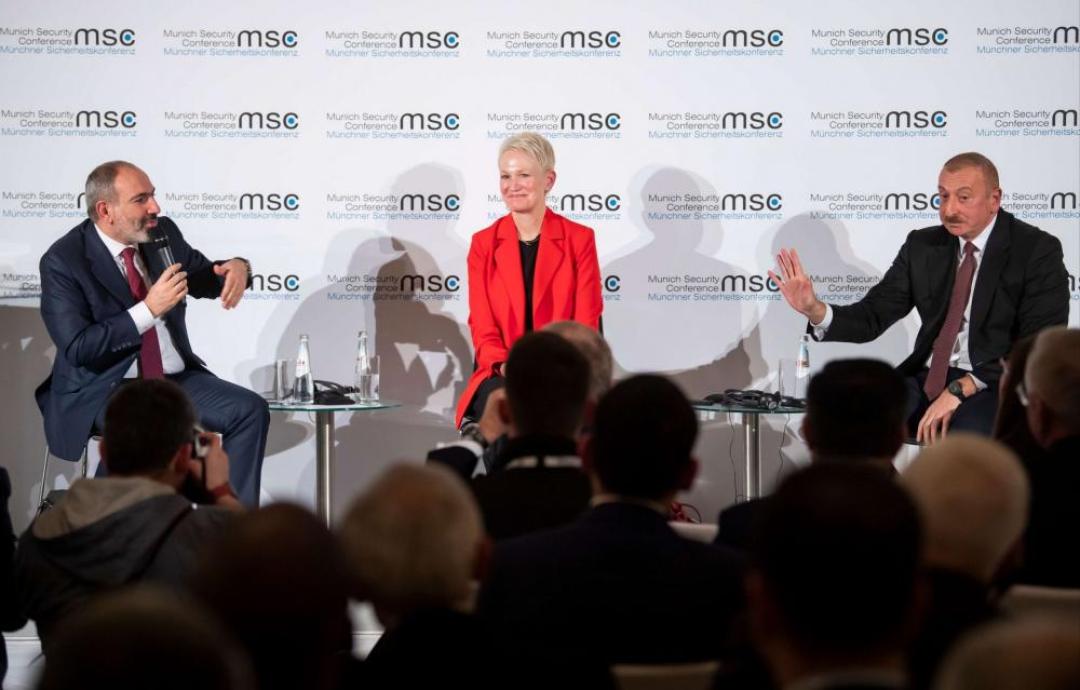
At least they laughed: Aliyev and Pashinyan at the Munich Security Conference

On 15 February, Armenian Prime Minister Nikol Pashinyan and Azerbaijani President Ilham Aliyev held a panel discussion at the Munich Security Conference (MSC). This was the first ever meeting between an Armenian and Azerbaijani leader in a public space. The two state leaders held a panel discussion on the Nagorno-Karabakh conflict.
The discussion between Aliyev and Pashinyan had a very historical focus regarding the issue of Nagorno-Karabakh, ranging even to the Armenian King Tigranes the Great, who ruled the Armenian lands in the period 95-55 BC. The two parties also exchanged views on the massacre in Khojaly. While Aliyev argued that the Azerbaijani population in Khojaly experienced a genocide, Pashinyan argued that the massacre in Khojaly was organized by the Azerbaijani opposition to remove the former Azerbaijani President Ayaz Mutallibov from the power (what Mutalibov personally denied).
Both leaders were confronted with the question of what the international community could do in order to find a resolution to the conflict. Pashinyan emphasized that the international community should make it strong and clear that there is no military solution to this conflict. Aliyev said that the international community should explain that Nagorno-Karabakh is a part Azerbaijan and put a serious pressure on Armenia to implement the UN Security Council’s resolutions. Pashinyan commented on Aliyev’s argument, saying that in the UNSC resolutions there is no phrase “Armenian troops”, but instead “local Armenian forces.”
Aliyev and Pashinyan were also confronted with the question if the two sides would consider submitting the Karabakh dispute to the International Court of Justice by a special agreement. Both leaders said that they were satisfied with the current format of negotiations under the OSCE Minsk Group mediation.
The two leaders also outed their support for the idea that the Karabakh conflict could be settled in several steps. Aliyev stated that the first step should be the liberation of part of the occupied territories, then the return of the Azerbaijani IDPs to those territories. This would be followed by the process of normalization of relations between Armenia and Azerbaijan, and then finally the final status of Nagorno-Karabakh should be discussed. Pashinyan emphasized the need for “micro revolutions” in order to come to the solution to the conflict. He named the examples his proposal that any solution of Nagorno-Karabakh conflict should be acceptable for people of Armenia, for people of Karabakh and for people of Azerbaijan, the use of social media to establish communication between the people, and the creation of the direct line of contact between him and Aliyev. Aliyev replied to Pashinyan’s proposal that the solution should be acceptable to the people of Armenia, Azerbaijan and Karabakh by highlighting the fact that 80% of the so-called Nagorno-Karabakh army are citizens of Armenia, and therefore the concept of Karabakh people doesn't exist.
After the discussion, Pashinyan presented his “six Munich principles“ following the meeting with Aliyev. According to Pashinyan those principles were: 1) Nagorno-Karabakh gained independence just like Azerbaijan did; 2) Nagorno-Karabakh is a party to the conflict and to the negotiations, it is not possible to solve the conflict without negotiation with Karabakh; 3) there is no territory, there is security; Nagorno-Karabakh cannot compromise its security; 4) it is not possible to solve the conflict by two actions, the talks require “micro revolutions”, then “mini revolutions” and a breakthrough; 5) any solution has to be acceptable to the people of Armenia, the people of Karabakh, and the people of Azerbaijan; 6) there is no military solution to the conflict. Pashinyan did not clarify if his “Munich principles” should substitute the Madrid principles and what role these principles would have in further negotiations between Armenia and Azerbaijan.
The MSC chairman Wolfgang Ischinger described the meeting between Aliyev and Pashinyan as a remarkable accomplishment. “The leaders of Azerbaijan and Armenia met for the first time in a public space, discussing the way forward on how to deal with the conflict in Nagorno-Karabakh. This deserves applause because it takes some courage,” he said.
The consensus among close observers of the conflict was that the event was counterproductive. “Even with the bar set vanishingly low, the Münich panel today bringing together leaders of Armenia and Azerbaijan was very disappointing,” tweeted Laurence Broers, a long-time scholar of the conflict and Caucasus program director at the peacebuilding NGO Conciliation Resources. “Both leaders missed almost every opportunity to step away from the same tired routine we’ve heard for years… The very few constructive sentiments got lost in historical-legal posturing, presumably for domestic audiences. Few people outside of the Caucasus will have understood much of that.”
During the exchange of arguments between Aliyev and Pashinyan the moderator of the event – Celeste Wallander, a former senior White House official and head of the U.S. Russia Foundation – said to the audience “at least they were both laughing,” which they truly did.
See Also


Mirzoyan Meets US Deputy Assistant Secretary Joshua Huck

Azerbaijani President Holds Talks with UAE and German Business Delegations on Economic Cooperation

Grigoryan Confirms Armenia’s Readiness to Dissolve OSCE Minsk Group Upon Peace Treaty Signing

Azerbaijani Official Warns of Ecological Risks to Caspian Sea, Similar to Lake Urmia and Aral Sea

